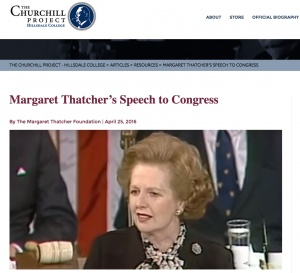Thatcher to Congress, 1985: Worth Remembering
Margaret Thatcher, in her thoughtful and prescient remarks, posted by the Hillsdale College Churchill Project, reached back into history to recall how far the English-Speaking Peoples have come since victory in World War II, and how much remained to accomplish. Like Churchill, Lady Thatcher would be pleased that for the most part, they met the tests before them, in his words, with “a stern sentiment of impartial justice, and above all the love of personal freedom, or as Kipling put it: ‘Leave to live by no man’s leave underneath the law.’” Churchill also warned Congress: “Be careful above all things not to let go of the atomic weapon until you are sure and more than sure that other means of preserving peace are in your hands.”
There is much of current relevance in the then-Prime Minister’s words: timeless truths that we would do well to ponder. “The frontier of freedom cuts across our continent,” Lady Thatcher said. In many ways it still does.
Thatcher (Excerpt):
 Winston Churchill’s vision of a union of mind and purpose between the English-Speaking Peoples was to form the mainspring of the West. No one of my generation can forget that America has been the principal architect of a peace in Europe which has lasted forty years. Given the shield of the United States, we have been granted the opportunities to build a concept of Europe beyond the dreams of our fathers; a Europe which seemed unattainable amid the mud and slaughter of the First World War and the suffering and sacrifice of the Second.
Winston Churchill’s vision of a union of mind and purpose between the English-Speaking Peoples was to form the mainspring of the West. No one of my generation can forget that America has been the principal architect of a peace in Europe which has lasted forty years. Given the shield of the United States, we have been granted the opportunities to build a concept of Europe beyond the dreams of our fathers; a Europe which seemed unattainable amid the mud and slaughter of the First World War and the suffering and sacrifice of the Second.
From these shores, it may seem to some of you that by comparison with the risk and sacrifice which America has borne through four decades and the courage with which you have shouldered unwanted burdens, Europe has not fully matched your expectations. Bear with me if I dwell for a moment on the Europe to which we now belong. It is not the Europe of ancient Rome, of Charlemagne, of Bismarck. We who are alive today have passed through perhaps the greatest transformation of human affairs on the Continent of Europe since the fall of Rome. In but a short chapter of its long history, Europe lost the position which it had occupied for two thousand years—and it is your history as much as ours.
Human progress is not automatic. Civilization has its ebbs and flows, but if we look at the history of the last five hundred years, whether in the field of art, science, technology, religious tolerance or in the practice of politics, the conscious inspiration of it all has been the belief and practice of freedom under law; freedom disciplined by morality, under the law perceived to be just.
I cannot conclude this address without recalling words made immortal by President Abraham Lincoln in his second Inaugural Address, when he looked beyond an age when men fought and strove towards a more peaceful future: “With malice towards none, with charity for all, with firmness in the right that God gives us to see the right. Let us strive on to finish the work we are in, to do all which may achieve and cherish a just and lasting peace among ourselves and with all nations.”
—Supplied by kind courtesy of the Margaret Thatcher Foundation.
Remembrance by a Friend
This posting reminds me of 5 November 1993, when Lady Thatcher spoke to a gathering of Churchillians at the British Embassy in Washington. After her remarks about Lincoln and Churchill, she worked the room, talking to people and shaking hands. I wondered what to say to her when she came my way. As we shook hands I said, “Thank you for sending the forces south to retake the Falklands.” She replied, “You know, when the Argies went into the Falklands there was nothing to do but throw them out!” Earlier, as I stood listening to her speak, I sensed someone move in to stand behind me. When she was done I turned around and saw Colin Powell. I greeted him and shook hands. Noticing the ribbon bar in my lapel for the Army Commendation Medal he said, “Thank you for your service.” Great stuff. —D.S.R., Iowa City, Ia.






